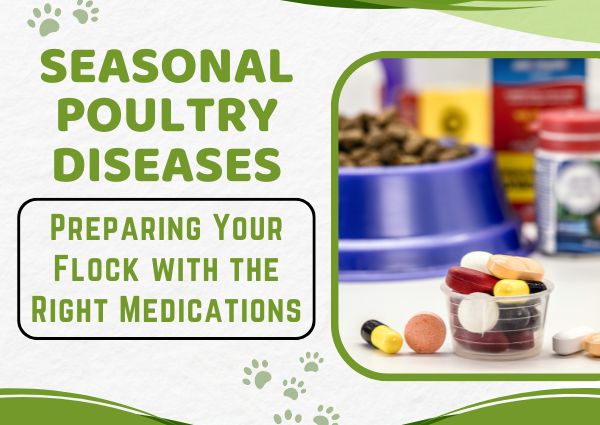Understanding The Seasonal Disease Cycle
Poultry diseases often show seasonal patterns due to fluctuations in environmental conditions. In the rainy season, for example, high humidity and damp litter can promote the growth of harmful bacteria, fungi, and parasites. During cold winters, poor ventilation and overcrowding can lead to respiratory diseases. In hot summers, heat stress weakens immunity, making birds more vulnerable to infections. Recognizing these patterns allows farmers to anticipate problems before they occur and implement targeted prevention strategies.
Common Seasonal Diseases in Poultry
One of the most frequent risks during the monsoon and post-monsoon seasons is coccidiosis. Caused by protozoan parasites, it damages the intestinal lining, leading to diarrhea, weight loss, and poor growth. Another rainy season concern is fowl cholera, a bacterial infection that can spread rapidly in wet conditions. In colder months, respiratory illnesses like infectious bronchitis, chronic respiratory disease (CRD), and infectious coryza become more prevalent. These diseases can reduce egg production, slow growth rates, and increase mortality. Hot summer months often see a rise in fowl pox outbreaks, as mosquitoes that transmit the virus thrive in warm weather. Additionally, heat stress itself can cause production losses and increase susceptibility to other infections.
Why Early Prevention Matters
Prevention is always preferable to cure in the poultry industry. Once a disease takes hold, it can spread rapidly through a flock, causing significant financial losses. Early prevention with the right medications not only safeguards bird health but also reduces the need for emergency treatments, which can be more costly and less effective. Moreover, in today’s market, consumers are increasingly conscious about food safety, preferring products from birds raised with responsible, targeted healthcare rather than indiscriminate antibiotic use.
Choosing the Right Medications for Each Season
Seasonal preparedness begins with understanding which medications are most effective against likely threats. For example, during the rainy season, anticoccidial medications can be introduced as part of the feed program to protect against coccidiosis. In addition, bacterial infections such as fowl cholera may require targeted antibiotics, but these should be used under veterinary guidance to prevent resistance. During winter, respiratory health boosters, vitamin supplements, and immune-strengthening products can help birds fight off viral and bacterial threats. In summer, electrolytes and vitamin C supplements can help combat heat stress, while vaccines for fowl pox can reduce seasonal outbreak risks.
The Role of Vaccination in Seasonal Disease Control
Vaccination is one of the most effective tools in seasonal poultry disease management. By building immunity before the disease season starts, vaccines reduce the risk of severe outbreaks. For example, vaccinating birds against Newcastle disease, infectious bronchitis, or fowl pox ahead of the high-risk season can save farmers from major production losses. However, vaccines must be stored, handled, and administered correctly to ensure effectiveness. At Amino Pharma, we emphasize the importance of a well-planned vaccination schedule tailored to your farm’s specific needs and regional disease patterns.
Supporting Medications with Good Farm Practices
While medications and vaccines are essential, they are most effective when combined with strong biosecurity and management practices. Seasonal disease prevention also involves keeping litter dry, ensuring proper ventilation, avoiding overcrowding, and providing clean, uncontaminated feed and water. Regular health monitoring allows early detection of symptoms, ensuring treatment can begin promptly. Probiotics and prebiotics can also be included in the feed to maintain gut health year-round, improving birds’ resilience to seasonal challenges.
Amino Pharma’s Approach to Seasonal Poultry Health
At Amino Pharma, we understand that no two farms face exactly the same challenges. That’s why our range of poultry healthcare solutions includes targeted medications, vaccines, and nutritional supplements designed for seasonal needs. We work closely with poultry farmers and veterinarians to create customized seasonal health plans that protect flocks before problems occur. Our products are developed to deliver reliable results while supporting sustainable, responsible poultry production.
Preparing Your Flock for the Season Ahead
Whether you are heading into a hot summer, a damp rainy season, or a cold winter, preparation is key to avoiding disease outbreaks. Farmers should work with veterinarians to assess past disease patterns, choose the right medications and vaccines, and put preventive measures in place early. By anticipating seasonal risks and acting before problems arise, poultry farmers can maintain healthy flocks, maximize productivity, and protect their profits.

